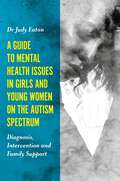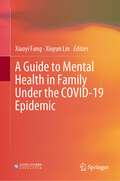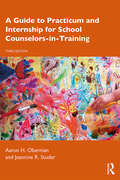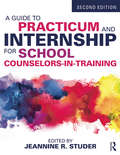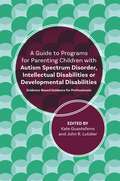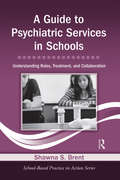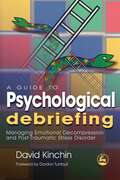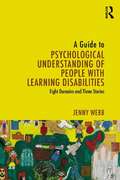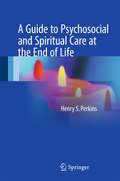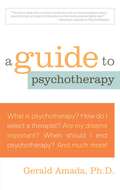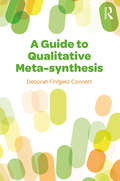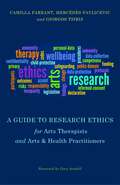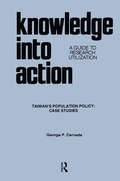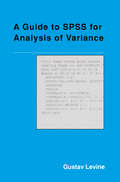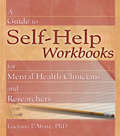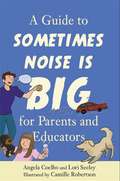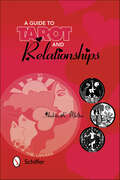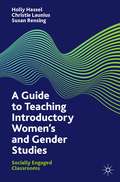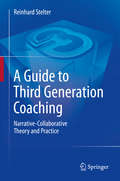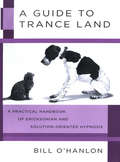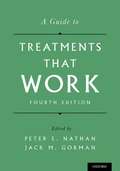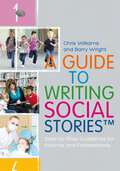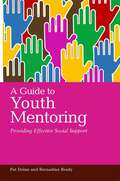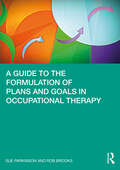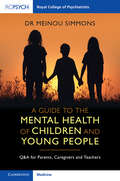- Table View
- List View
A Guide to Mental Health Issues in Girls and Young Women on the Autism Spectrum: Diagnosis, Intervention and Family Support
by Judy EatonThis book addresses the specific mental health needs of girls and young women with autism spectrum disorder (ASD). Looking at the ways autism presents differently in girls than in boys, and the mental health conditions that occur most frequently in girls with ASD, this is the essential guide for clinicians and educators on tailoring interventions and support to meet girls' needs. Describing the current assessment process for autism diagnosis, the book explains why girls are under- or mis-diagnosed, leading to later mental health issues. It outlines the types of intervention that are particularly helpful for working with girls to reduce anxiety, improve social interaction skills, and manage self-harm. The book also covers how to manage eating disorders and feeding difficulties, focusing on working with girls with sensory processing difficulties. There is advice on how to deal with the emotional impact on parents, carers and families, and the challenges they face when negotiating appropriate psychological and educational support.
A Guide to Mental Health in Family Under the COVID-19 Epidemic
by Xiaoyi Fang Xiuyun LinThis book tells us from a professional perspective how to deal with stress response in the family, effectively address family problems in the epidemic, and handle the infectious emotions. This book is a profound explanation of the new stress, conflicts, and problems arising at home amid the epidemic. It provides people with a psychological self-help scale to effectively distinguish the normal and abnormal states of psychological response. Besides, it also provides professional psychological assistance and suggestions for special groups, including children, the elderly, the quarantined, and the bereaved, in order to help all families actively respond to the epidemic with the power of psychology.
A Guide to Practicum and Internship for School Counselors-in-Training
by Jeannine R. Studer Aaron H. ObermanThe ideal resource for school counseling field experiences, the updated and expanded third edition of A Guide to Practicum and Internship for School Counselors-in-Training covers all aspects of the practicum and internship experience from the initial contact with supervisors to detailed descriptions of students’ different roles. Readers will gain an awareness of school culture and the understanding needed to develop an individualized philosophy of school counseling. Each chapter contains activities, case studies, worksheets, and images to facilitate understanding, and all material is consistent with both the Council for Accreditation of Counseling and Related Educational Programs (CACREP) 2016 Common Core and School Counselor Entry-Level Specialty Areas and the school counselor standards identified by the American School Counselor Association (ASCA). Specific focus is given to strategies for implementing the ASCA National Model (4th edition) as a part of clinical experiences. This text can be used by faculty, students, and supervisors alike to support and enhance the school counseling knowledge base used to meet the needs of all students.
A Guide to Practicum and Internship for School Counselors-in-Training
by Jeannine R. StuderA Guide to Practicum and Internship for School Counselors-in-Training, 2nd ed, covers all aspects of the practicum and internship experience, from the initial contact with supervisors to detailed descriptions of students’ different roles. Readers will gain both an awareness of the school culture and the understanding needed to develop an individualized philosophy of school counseling. Specific topics covered include popular counseling theories used by school counselors, strategies for working with special populations of students, understanding the school counselor's role in utilizing the 2012 National Model of the American School Counselor Association (ASCA) including the inherent elements and themes, putting the ASCA ethical standards into practice, and administration of day-to-day tasks. Each chapter contains activities, case studies, worksheets, and images to facilitate understanding, and all material presented is consistent with both the accreditation standards of the Council for the Accreditation of Counseling and Related Educational Programs (CACREP) and the school counselor standards identified by the ASCA.
A Guide to Programs for Parenting Children with Autism Spectrum Disorder, Intellectual Disabilities or Developmental Disabilities: Evidence-Based Guidance for Professionals
by V. Mark Durand Susan Timmer Anthony Urquiza Katelyn M. Guastaferro John R. Lutzker Yona Lunsky Lynn Koegel Brittany Koegel Robert Koegel Shelley Clarke Julia Strauss Laura Lee McIntyre Mallory Brown Melissa A. Mello Meagan Talbott Sally Rogers Sandy Magana Wendy Machalicek Kristina Lopez Emily Iland Brandi Hawk Ronit M. Molko-Harpaz Kenneth Fung Lee Steel Kelly BryceThis book provides a comprehensive outline of the major parent training programs for parents of children with intellectual or developmental disabilities (IDD), including Autism Spectrum Disorder. Parents or primary caregivers spend the most time with a child, and training them in behaviour management and intervention strategies is critical to improving a child's behaviour, to helping them to learn new skills, and to reduce parental stress. Authored by eminent specialists in the field and written for researchers and clinicians supporting or treating families, each chapter focuses on one of the key evidence-based parent training programs - from Incredible Years® and Positive Family Intervention through to Pivotal Response Treatment and Acceptance and Commitment Therapy. Each chapter provides a breakdown that features an introduction to the model, evidence for the model, a full description of the model, a discussion of implementation and dissemination efforts, and concluding comments. Grounded in research, this definitive overview provides the evidence and guidance required for anyone considering investing in or running a parenting program.
A Guide to Psychiatric Services in Schools: Understanding Roles, Treatment, and Collaboration (School-Based Practice in Action)
by Shawna S. BrentIn order to provide comprehensive care to students with a wide variety of social and emotional challenges, close collaboration between psychiatrists and school-based mental health professionals is vital. This book provides practical information about psychiatric diagnoses and medications, as well as effective ways to communicate with physicians, to ensure that the needs of all students and their families are met. Brent reviews the process and content of a psychiatric evaluation, the general principles of psychopharmacology, and the various classes of medications. Subsequent chapters then focus on different psychiatric diagnoses and treatment options. Characteristics, evaluation, and treatment methods are discussed for mood, anxiety, psychotic, pervasive developmental, and externalizing behavior disorders with case examples provided throughout for illustration. A brief overview of mental health crises, including suicidal statements, physical aggression, and self-harm behaviors, and how these can best be handled in the educational setting is also provided. School-based mental health professionals will find this book to be a clear, concise, and practical guide to facilitating strong communication and collaboration amongst themselves, educators, and physicians.
A Guide to Psychological Debriefing: Managing Emotional Decompression and Post-Traumatic Stress Disorder
by David Kinchin'In its essence, this is a practical book that focuses on aiding recovery from trauma over a carefully structured timeframe. Amongst other things, it provides an introduction to the concept of psychological debriefing and some of the effects of trauma, including post-traumatic stress disorder (PTSD). This book will appeal to a broad audience because it is easily accessible, not only to those professionals working with clients suffering from PTSD, but also to health practitioners, psychologists, social workers and counsellors, as well as students.' - Well-Being 'David Kinchin pays special attention to setting up optimal conditions to facilitate emotional decompression. He takes into account that trauma reactions, primarily concerned with survival, are whole-system reactions, affecting both the body and mind. He also reminds us that the initial impact of the trauma is on physical structures in the brain, disrupting memory-processing capacity, which is designed to create space and time to heal. We should all pay a great deal of attention to what he says.' - Professor Gordon Turnbull, Consultant Psychiatrist, University of Chester, Capio Nightingale Hospital, London and Ridgeway Hospital, Swindon, UK Traumatic events strike unexpectedly and turn everyday experiences upside down. Frequently, people suffering such trauma cannot shake the experience and develop Post-Traumatic Stress Disorder (PTSD). Psychological debriefing (PD) is a widely practised process used as an intervention for treating people who have been exposed to trauma. It allows people who have been exposed to trauma to re-examine the traumatic event in a safe and controlled environment, and reduces the risks of developing PTSD. This book is a practical introduction to PTSD and psychological debriefing, and offers an enhanced model of PD which the author terms `Emotional Decompression'. Structured like a deep-sea dive, which has to include carefully planned safety stops on the way back to the surface to avoid getting `the bends', this model provides time frames for how long to spend at various stages of the PD process, and when to stop for discussions and explanations. The focus is on aiding recovery from this `invisible injury' over carefully structured time. The book presents a range of recovery models, from the `simple' models developed by Williams and Horowitz to the more complex `Snakes and Ladders' model developed by the author. Appendices include an essay by one of the world's leading exponents of psychological debriefing, Atle Dyregrov, as well as case studies of debriefs completed by the author, including that of a survivor of the July 7th bombings in London. A Guide to Psychological Debriefing is an essential book for health practitioners, counsellors, psychologists and professionals working with clients suffering from PTSD, as well as students.
A Guide to Psychological Understanding of People with Learning Disabilities: Eight Domains and Three Stories
by Jenny WebbWho are the people we describe as having learning or intellectual disability? Many clinical psychologists working in a mental health setting are now encountering people with learning disabilities, in some cases for the first time. This book provides the background information and understanding required to provide a basis for a truly inclusive and effective service for people with learning disability. In A Guide to Psychological Understanding of People with Learning Disabilities, Jenny Webb argues that we need a new, clinically-based definition of learning disability and an approach which integrates scientific rigour with humanistic concern for this group of people, who are so often vulnerable to misunderstanding and marginalisation. Psychological approaches need to be grounded in an understanding of historical, theoretical and ethical influences as well as a body of knowledge from other disciplines. The Eight Domains is a simple but holistic method for information gathering, while The Three Stories is an integrative model of formulation for use in relation for those people whose needs do not fit neatly into any one theory. Divided into three sections, the book explores: Understanding the context Understanding the person: eight domains Making sense: three stories. This book provides an invaluable guide for trainee clinical psychologists and their supervisors and tutors, working with adults with learning disability. It will also be valuable for clinical psychologists working in mainstream settings who may now be receiving referrals for people with learning disability and want to update their skills.
A Guide to Psychosocial and Spiritual Care at the End of Life
by Henry S. PerkinsPsychological, social, and spiritual care is as important as physical care at the end of life. Yet caregivers often feel ill-equipped to give that nonphysical care. This book shows how to do it. The book addresses all caregivers who attend dying patients: doctors, nurses, chaplains, clergy in the pastorate, social workers, clinical psychologists, family caregivers, and others. It covers such topics as the functional and emotional trajectories of dying; the varied approaches of patients and caregivers to end-of-life decisions; culturally based beliefs about dying; the differences between depression and grief; and people's views about the right time to die, the death experience itself, and the afterlife. For each topic the book introduces core concepts and summarizes recent research about them. The book presents much of its material in readable tables for easy reference; applies the material to real-life cases; lists the main "take home" points for each chapter; and gives references for additional reading. The book helps caregivers anticipate the reactions of patients and survivors to end-of-life traumas and suggests how caregivers can respond insightfully and compassionately. At the same time the book challenges caregivers to think through their own views about death and dying. This book, therefore, is a must-read for all caregivers―professional and nonprofessional alike―who strive to give their patients comprehensive, high-quality end-of-life care.
A Guide to Psychotherapy
by Gerald Amada Ph.DThis book is about a personal journey, an adventure that has the potential to change one's entire outlook. It is an introduction to psychotherapy that provides clear and direct answers to commonly asked questions about psychological treatment: How do I know when to enter therapy? How do I go about selecting a therapist? Does psychotherapy really work? Do I have to relive my past? Are my dreams important? When should I end psychotherapy? And much more.
A Guide to Qualitative Meta-synthesis
by Deborah Finfgeld-ConnettA Guide to Qualitative Meta-synthesis provides accessible guidelines for conducting all phases of theory-generating meta-synthesis research, including data collection, analysis, and theory generation. It is a research methodology that is designed to generate evidence-based theory by extracting, analyzing, and synthesizing qualitative findings from across published investigations. These theories provide scaffolding that can be used by health-care providers and other professionals to make context-based decisions and implement situation-specific actions. Theory-generating meta-synthesis methods stem from the qualitative research paradigm, especially grounded theory. Systematic and rigorous methods are used to identify topically related research reports that provide qualitative findings for analysis. The subsequent analysis of the data goes beyond merely reorganizing and recategorizing research findings. Newly synthesized concepts are developed, and the dynamic relationships among them are fully articulated. The validity of the resultant theory is ensured based on theoretical, methodological, and researcher triangulation; unbiased data collection and sampling strategies; inductive-deductive data analysis and synthesis strategies; and continuous reflexivity. Meta-synthesis-generated theories are highly important in environments where the use of normalized algorithms, guidelines, and protocols are on the rise. The types of theories discussed in this book will help service providers customize standardized tools so that the most effective evidence-based, yet individualized, interventions can be implemented.
A Guide to Research Ethics for Arts Therapists and Arts & Health Practitioners
by Gary Ansdell Mercedes Pavlicevic Camilla Farrant Giorgos TsirisThis practical guide aims to inspire ethically-aware practitioners to become ethically-aware researchers, evaluators and participants. Conducting a research project, whatever the setting, requires not only knowledge of research methods but also an in-depth understanding of research ethics. Embedded in 'real life' experiences of research ethics applications, this guide navigates the reader through research ethics procedures, drawing from legislation and a range of research ethics committee regulations. Although the emphasis is on research, ethical considerations presented in this guide are equally relevant and applicable to other types of enquiry, including monitoring and evaluation projects. Whether leading a research project, being part of a research team or taking part as a research participant, this book is essential reading for all arts & health practitioners and arts therapists.
A Guide to Research Utilization: A Guide to Research Utilization
by George Peter CernadaAims to describe why and how applied research carried out in a national public health program sometimes influenced program action in the field - and sometimes did not. This title presents and analyses a number of modified case studies to draw some practical lessons and to provide a theoretical basis for future program action.
A Guide to SPSS for Analysis of Variance
by Gustav LevineThis book offers examples of programs designed for analysis of variance and related statistical tests of significance that can be run with SPSS. The reader may copy these programs directly, changing only the names or numbers of levels of factors according to individual needs. Ways of altering command specifications to fit situations with larger numbers of factors are discussed and illustrated, as are ways of combining program statements to request a variety of analyses in the same program. The first two chapters provide an introduction to the use of SPSS, Versions 3 and 4. General rules concerning the use of commands, subcommands, and keywords are discussed, providing a specific introduction to the use of SPSS for analysis of variance. They provide detailed programs for obtaining omnibus F tests in completely randomized designs and for designs that include repeated measures factors. The remaining chapters may be read independently and in any order.
A Guide to Self-Help Workbooks for Mental Health Clinicians and Researchers
by Luciano L'AbateNever has the need for a compendium of self-help workbooks been so great! From the founder of the world&’s first PhD program in Family Psychology comes an extensive guide to nearly all of the mental health workbooks published through 2002. Placed together in one volume for the first time, A Guide to Self-Help Workbooks for Mental Health Clinicians and Researchers includes reviews and evaluates the complexity of each workbook in regards to its form, content, and usability by the client. From abuse to women&’s issues, this annotated bibliography is alphabetized by author, but can also be researched by subject. While self-help workbooks are currently not as popular or as mainstream as self-help books and video, that could soon change. Self-help workbooks are versatile, cost-effective, and can be mass-produced. The workbook user is active rather than passive, and the mental healthcare worker can analyze a more personal response from the user, whether in the office or via the Internet. A Guide to Self-Help Workbooks for Mental Health Clinicians and Researchers brings these workbooks together into one sourcebook to suit anyone&’s needs. Each self-help workbook is reviewed according to specific criteria: contents structure specificity goal level of abstraction a subjective evaluation usually concludes the review of the workbook A Guide to Self-Help Workbooks for Mental Health Clinicians and Researchers also includes: an in-depth introduction discussing the need for workbooks in mental health practices indices for subject as well as author an address list of the publishing houses for the workbooks annotated in the bibliography an Informed Consent Form to verify compliance with ethical and professional regulations before administering a workbook to a client A Guide to Self-Help Workbooks for Mental Health Clinicians and Researchers offers you a complete resource to self-help workbooks for all mental health subjects. Dr. L&’Abate&’s highly selective review process helps you find exactly what you need. This unique sourcebook is vital for mental health clinicians, counselors, schoolteachers, and college and graduate students.
A Guide to Sometimes Noise is Big for Parents and Educators
by Angela Coelho Lori Seeley Camille RobertsonUnderstand how children with autism experience the world around them with this simple guide. Learn why they might react unexpectedly to lights, noise, and even seemingly simple requests, and what you can do to help reduce sensory overload. This accompanying guide to the children's picture book Sometimes Noise is Big takes the illustrations and gives a breakdown of what is happening in each picture, with practical tips on how to help children who struggle with sensory issues. This book can also be used as a standalone resource, and is ideal for supporting children aged 5+ with autism at home, in the classroom, and for raising awareness of autism and sensory issues.
A Guide to Tarot and Relationships
by Andria K. MolinaUse the Tarot to bring about and enhance all of your relationships! Conscious thought process can be reflected through the symbolism and the language of Tarot – now, via your specialized card readings, you can identify key issues and helping aids to repair or improve your personal relationships. Enable patterns of constructive development into your psyche, find answers for love and self exploration, or discover time frames for events that affect your relationships. A Questions Statement is applied to each card to help you identify questions and to creatively form compelling answers. In addition to metaphorical meanings for each card, a general significance section is included for usage with other life issues. Modern-style illustrations by artist Delores Fitchie accompany the instructions.
A Guide to Teaching Introductory Women’s and Gender Studies: Socially Engaged Classrooms
by Christie Launius Holly Hassel Susan RensingThis book provides a practical, evidence-based guide to teaching introductory Women's and Gender Studies courses. Based on the findings of a Scholarship of Teaching and Learning project that analyzed 72 Intro students’ written work, the authors equip instructors with key principles that can help them adapt their pedagogy to a range of classroom environments. By putting student learning at the center of course design, the authors invite readers to reflect on their own investments in and goals for the introductory course. The book also draws on the authors’ combined decades of teaching experience, and aims to help instructors anticipate the emotional, intellectual, and interpersonal challenges and rewards of teaching and learning in the introductory WGS course. Chapters focus on course design, including identifying desired learning outcomes (in terms of course content, skills, and dispositions or habits of mind); choosing course materials; pedagogical activities; and assessing student learning. This book will be an invaluable resource for experienced WGS instructors and those seeking or planning to teach it for the first time, including graduate students and high school teachers.
A Guide to Third Generation Coaching: Narrative-Collaborative Theory and Practice
by Reinhard StelterThis book proposes third generation coaching in a form where the coach and the coaches are less concerned with solutions and more concerned with creating space for (self-)reflection through collaborative practices. Offering a revisited and innovative approach to coaching psychology, advantageous for learners and practitioners alike. It marks a new trend in coaching and has a special profile, based on the acknowledgement of changes in society, learning and knowledge production, as well as leadership. The author' s concept of coaching distinguishes itself from the existing models (pop coaching , GROW model, etc) by offering a fresh analysis of our society - a society that is characterised by diversification, identity challenges, abolition of the monopoly of knowledge, lifelong learning, the necessity for self-reflection, etc. These societal changes are the basis for the existence of coaching and its prevalence, but they must also be the foundation for the way we employ coaching.
A Guide to Trance Land: A Practical Handbook of Ericksonian and Solution-Oriented Hypnosis
by Bill O'Hanlon<P> A friendly and brief guide to the essentials of hypnosis. <P> Popular author Bill O’Hanlon offers an inviting and reassuring guide to the essentials of hypnosis, alleviating the newcomer’s anxieties about how to make the most of this clinical tool. This brief book illustrates the benefits of solution-oriented hypnosis, which draws on the work of the pioneering therapist Milton Erickson (with whom O’Hanlon studied) and emphasizes doing what is needed to get results—which, more often than not, means trusting that the client holds within him- or herself answers or knowledge that need only be tapped or released by the therapist. <P> O’Hanlon covers the key aspects of hypnosis, including: using possibility words and phrases; using passive language; and inducing trance. O’Hanlon offers practical tips and friendly encouragement for the novice hypnotherapist—in his characteristic warm, reassuring, and humorous style.
A Guide to Treatments that Work
by Peter E. Nathan Jack M. GormanLike its predecessors, this fourth edition of A Guide to Treatments That Work offers detailed chapters that review the latest research on pharmacological and psychosocial treatments that work for the full range of psychiatric and psychological disorders, written in most instances by clinical psychologists and psychiatrists who have been major contributors to that literature. Similarly, the standards by which the authors were asked to evaluate the methodological rigor of the research on treatments have also remained the same. Each chapter in A Guide to Treatments That Work follows the same general outline: a review of diagnostic cues to the disorder, a discussion of changes in the nomenclatures from DSM-IV to DSM-5, and then a systematic review of research, most of which has been reported within the last few years, that represents the evidence base for the treatments reviewed. In all, 26 of the volume's 28 chapters review the evidence base for 17 major syndromes.
A Guide to Writing Social Stories™: Step-by-Step Guidelines for Parents and Professionals
by Chris Williams Barry WrightSocial StoriesTM are a widely used and highly effective intervention for supporting children on the autism spectrum, but it can feel overwhelming to follow all the rules put in place to create personalised stories. Developed with the input of parents and professionals, and informed by new Social Stories research, this is a comprehensive, clear, easy step-by-step guide to writing effective personalised Social StoriesTM that give children social information, creating many benefits for them. The book includes many examples of real Social Stories created for children by parents and teachers working together, and handy downloadable checklists that highlight the essential components of a Social Story, helping to ensure that each story you write achieves the best possible results.
A Guide to Youth Mentoring
by Pat Dolan Bernadine BradyYouth mentoring can be an effective way of supporting troubled youth, helping them sustain positive mental health, cope with stress, and lead successful lives through adolescence and into adulthood. This book is a comprehensive guide to youth mentoring programmes, illustrating how, if managed well, they can increase the social support available to young people. It outlines the objectives and benefits of mentoring, how it works, and how to mentor successfully. Youth mentoring in community and school settings is covered, as well as mentoring for vulnerable youth. The book illustrates different mentoring models and provides practical strategies for assessing, setting up, and monitoring the mentoring relationship and its outcomes for the young person. The challenges and difficulties associated with mentoring programmes and strategies to overcome them are also addressed. This will be an essential guide for anyone working with young people, including youth workers, social workers, residential care staff, foster carers, community development workers, teachers and community police.
A Guide to the Formulation of Plans and Goals in Occupational Therapy
by Sue Parkinson Rob BrooksThis practical guide for occupational therapists introduces a tried and tested method for moving from assessment to intervention, by formulating plans and measurable goals using the influential Model of Human occupation (MOHO). Section 1 introduces the concept of formulation – where it comes from, what it involves, why it is important, and how assessment information can be guided by theoretical frameworks and organised into a flowing narrative. Section 2 provides specific instructions for constructing occupational formulations using the Model of Human Occupation. In addition, a radically new way for creating aspirational goals is introduced - based on a simple acronym - which will enable occupational therapists to measure sustained changes rather than single actions. Section 3 presents 20 example occupational formulations and goals, from a wide range of mental health, physical health and learning disability settings, as well as a prison service, and services for homeless people and asylum seekers. Designed for practising occupational therapists and occupational students, this is an essential introduction for all those who are looking for an effective way to formulate plans and goals based on the Model of Human Occupation.
A Guide to the Mental Health of Children and Young People: Q&A for Parents, Caregivers and Teachers
by Meinou SimmonsSupporting the mental health and well-being of children and young people is a top priority for parents, caregivers and teachers, but it can be tricky to find reliable and evidence-based information. Written by an experienced child and adolescent psychiatrist, in a user-friendly question and answer format, this book outlines the mental health challenges facing our children and young people and offers practical advice on how to best support them. The book covers a wide range of topics, including how biological factors and lifestyle factors affect mental health, parenting strategies, managing school, building networks of support, and connecting with children and young people. It gives a broad overview of the most common mental health difficulties and disorders, and considers how they can be managed. A must read for anyone looking to understand what a child or young person may be experiencing and why, and the practical ways in which to effectively support them.
